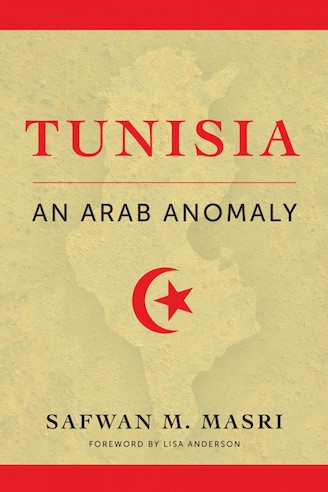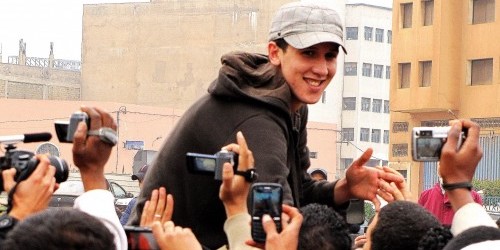by Rory McCarthy
 It is now nearly seven years since uprisings brought down authoritarian rulers across the Arab world, but only in Tunisia have there been significant achievements in consolidating a new democracy. There are two contradictory conclusions to draw from this. Either the Tunisian political process offers vital insights that might be applicable in other Arab countries, or the transition relies on unique characteristics that make it unlikely to be imitated elsewhere. Safwan Masri has written a book revealing his deep affection for Tunisia and its history, but ultimately his Tunisia: An Arab Anomaly argues that these political successes are so particular that they cannot be replicated. It is a surprisingly pessimistic conclusion for a book so admiring of the Tunisian experience.
It is now nearly seven years since uprisings brought down authoritarian rulers across the Arab world, but only in Tunisia have there been significant achievements in consolidating a new democracy. There are two contradictory conclusions to draw from this. Either the Tunisian political process offers vital insights that might be applicable in other Arab countries, or the transition relies on unique characteristics that make it unlikely to be imitated elsewhere. Safwan Masri has written a book revealing his deep affection for Tunisia and its history, but ultimately his Tunisia: An Arab Anomaly argues that these political successes are so particular that they cannot be replicated. It is a surprisingly pessimistic conclusion for a book so admiring of the Tunisian experience.
Masri’s argument is that Tunisia’s democratic achievements are not simply down to well-rehearsed observations like the fact that the population is small and homogenous, that it lacks the curse of petroleum resources, or that it has benefitted from having a small, apolitical military. What has been most important, he argues, is a ‘remarkable culture of reform’ rooted in a progressive and adaptive brand of Islam. This has produced a distinct Tunisian identity, drawn from an amalgam of civilizational experiences, and which is demonstrated by historic achievements in terms of education, women’s rights, religious reform, and civil society. These ingredients made the country ‘predisposed to democracy’, he writes, and reveal what is lacking elsewhere in the Arab world.
In the first third of the book, Masri gives an account of the run-up to the revolution of 2010–11 and the political process that followed. The author draws from interviews he conducted in Tunisia, mostly with political elites, as well as news reports and secondary sources. The book is written as a quest to understand the Tunisian experience rather than as an academic work, and it is very readable. The second section of the book narrates Tunisian history from Dido of Carthage to independence in 1956. Masri identifies what he calls the ‘roots’ of Tunisian identity as the political and intellectual reformist movement which began in the mid-nineteenth century. He argues this moment laid the foundations for the reforms of the newly-independent Tunisian state and, later, of its transition to democracy.
The final third of the book appraises the legacy of Habib Bourguiba, Tunisia’s independence leader and first president. Masri acknowledges that Bourguiba was arrogant, ruthless, and dictatorial, but he considers his reforms essential to explaining the country’s trajectory after 2011. He argues that Bourguiba dealt with religion ‘masterfully’, using Islamic justification for his reforms while also subjugating religion as a domain of the state. He pays detailed attention to reforms in education and the resulting rise in school enrolment. These education policies also constructed a particular Tunisian identity: ‘Toleration and acceptance became deeply rooted in the Tunisian psyche enabling the enlightened progression of the country toward democratization and freedoms not experienced elsewhere in the region.’
One of the most interesting chapters explores how the education system stumbled in the years after Zine al-Abidine Ben Ali seized power in 1987. Though he widened access to school and university, Ben Ali also presided over a sharp decline in educational standards. Universities produced more graduates but failed to equip them for the job market, spreading a sense of worthlessness among young people.
The book provokes interesting questions. Is the Tunisian experience really so different from the rest of the region? After the French protectorate, Tunisia was ruled for decades by a single, mass-party regime. The regime was hit by the economic crisis of the mid-1980s and tried to escape it through a brief, ill-fated political opening. Then Ben Ali reverted to authoritarianism, repressing political opponents and offering a corrupt economic liberalisation in lieu of political change, while clinging to a hollow mantra of ‘reformism’. This is a recent history familiar to many other Arab nations.
Was the Tunisian transition towards democracy quite so pre-ordained? A different version of the proportional representation system chosen in 2011 would probably have produced an outright Islamist majority. Would al-Nahda then have been so ready to compromise its positions? In April 2014, deputies in the assembly defeated by just a single vote a proposal to exclude former ruling party figures from political life. If that vote had gone the other way, would it have still enabled the elite compromise that now characterizes the political process? And how much will the unresolved economic and social crisis erode the country’s political achievements?
For Masri, Tunisia’s key advantage lies in education. Bourguiba’s encouragement of critical analysis in schools, he argues, has avoided the ‘intellectual despotism’ which he sees as typifying other Arab education systems and which makes the region ‘ill prepared for democracy’. But much scholarly work has been done to demonstrate that factors other than a lack of preparation mitigate against democratic transitions. And, as he himself demonstrates, the Tunisian education system has been facing serious problems for at least two decades. Perhaps Tunisia at least offers some guidance as to how political actors elsewhere in the region might negotiate their own paths away from authoritarianism and how the challenges they confront could yet be overcome.
Rory McCarthy is a Fellow by Examination at Magdalen College, Oxford. He is completing a book on Tunisia’s Islamist movement al-Nahda, and works on social movements and contentious politics in the Middle East and North Africa. He tweets at @rmccarthy








2 Comments